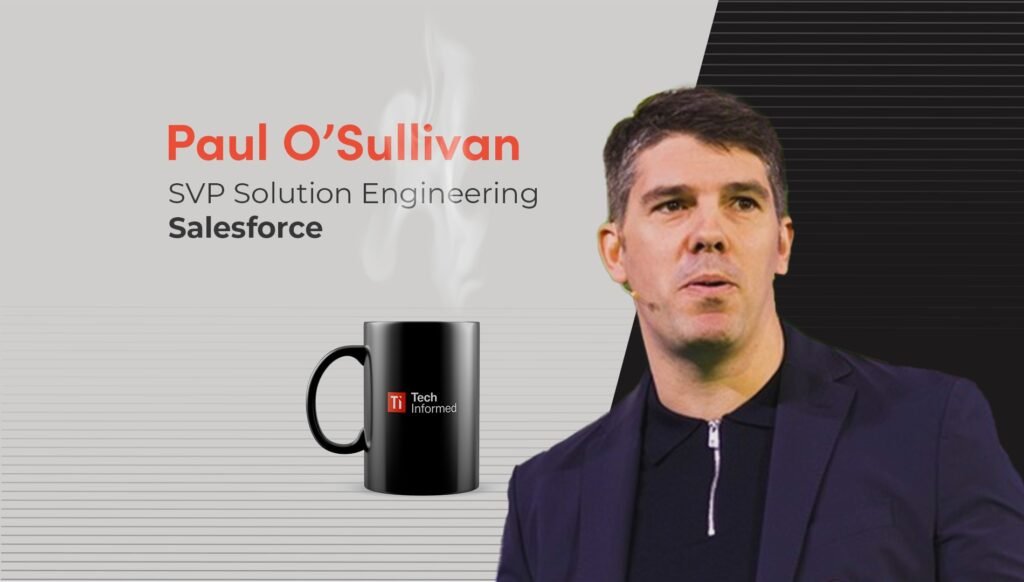From building his first PC at the age of 12 to working for major technology companies such as IBM, Accenture and now Salesforce, technology has always played an important role in Paul O’Sullivan’s life. But this Croydon (south London)-born software engineer, who later became senior vice president of solutions engineering at Salesforce, started his career in a local butcher shop.
How did you get into the technology industry?
My first job was at a butcher shop. That’s where I met my wife. After the owner’s father became ill, they asked me to work full time, and I agreed because loyalty is an important value of mine. I ended up running a store, which was a good lesson in running a business.
My first mentor, the owner, encouraged me to attend night school. There I earned my Cisco Certified Network Engineer, which led to my first real job in technology. It was a collaboration with Research in Motion, the company that developed BlackBerry.
What is the most important lesson you learned from working in a butcher shop that you still apply today?
My mentor there lived by three important rules, which can be applied to technology as well.
First, he lived by the principle of always leaving the door open in the butcher shop. The key concept there was the elimination of friction. If someone has to open the door, there will be immediate friction. This can be applied to reduce friction in the technology experience.
Second, always try to smile. No one wants to work with someone who looks miserable. As a teenager working in a store, I quickly realized it was easier to sell meat with a smile.
The third factor I still use is that if you sell a bad product, no one will trust you. I stuck with this throughout my career as an engineer. You are only as good as your last project.
What attracted you to Salesforce?
Prior to this role, he ran the software engineering and innovation business at Accenture. But our UK CEO, Zahra Bakhloloumi, brought me on board. She called me and said she would love it here, and she wasn’t wrong.
The culture is amazing, especially the way people support each other. Most importantly, there was no business problem that our technology couldn’t solve. As a technology geek, that’s what really attracted me to Salesforce.
What are you excited about in technology right now?
Clearly, we are in the midst of an AI revolution. I don’t think this will deter consumers. They will continue to demand more from companies.
At Salesforce, we need to help our customers navigate this increasingly complex environment. But what I’m excited about is discovering how we can help our partners unlock value throughout the enterprise.
We’re also excited to see what happens when these fundamental AI models pivot to quantum, or when quantum computing is combined with classical computing to create a layered approach. is.
We are already seeing significant benefits from a multi-LLM approach that integrates predictive and generative AI. But when you add quantum to the mix, customer value increases exponentially.
What do you do to relax?
Family is very important to me. I have a 12 year old (already 21!) and a 5 year old. It’s so much fun watching them grow.
It sounds silly, but I enjoy sitting on the sideline and watching them play sports. I’m not one of those loud parents. Watching them play, seeing how they develop, you can really switch off.
What are your hobbies when you are not working?
Several projects are underway. I’ve been making some mini robots. I’ve always been a techie at heart.
I also run a little, but my wife might say I don’t run as much as I should.
If you could have coffee with any historical figure, who would it be and why?
Alan Turing.
Not only was he ahead of his time, he also faced personal challenges as his lifestyle at the time was not socially acceptable. We all struggle with the struggle between pursuing our passions and who we truly are as human beings. Whether we are pushing the boundaries of the technological revolution.
But we also have personal lives. If they conflict, that balance can be very difficult.
How do you drink coffee?
white. Probably too often since it doesn’t have sugar in it.

